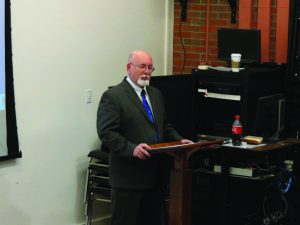Marielle Genovesi Staff Writer
Dr. Payne first brought forth a question, which allowed the remainder of his presentation to take form: Why are we in such a rush to succeed? Is education something that is merely a utility, something that is only valuable in monetary terms? Payne questions why, in today’s society, we are so very eager “to turn our students’ springs into summers.” He proposes this as a controversy for a liberal arts institution, and especially for students of the arts and humanities who are taught to “think both creatively and analytically.”
If the aim of college is to make the most of men and women, the arts and humanities are crucial in multiple ways to the well-roundedness of a student. The arts and humanities tend to be fields, says Payne, “that are often thought to be in crisis and that are under attack” but, they are instead fields which give one “ethics, a development of empathy and a connection between behavior and consequences.” Payne continued to discuss the former value of humanities as a contribution to the greater goal, or the formation of an individual of many abilities and talents. However, today the idea of learning “for learning’s sake does not come off as very persuasive to many parents.” But, should learning only remain in the classroom, or is it something that one should continue outside of academic spaces?
Businesses and employers today, says Payne, actually value individuals who are able to write and read efficiently, and who “demonstrate the ability to think critically and clearly to solve problems”—attributes which apply not only to an arts and humanities pupil, but also to a liberal arts student. Dr. Payne’s greatest hope is that with the strengthening of the arts and humanities will come the establishment of better thinkers.
Payne continued this by proposing, “What would our campus be like without the arts and humanities?,” reminding his audience that a huge number of the “cool” things students have the chance to participate in fall under the umbrella of the arts and humanities. Yet, he points out, that regardless of opportunity, what does an ever-increasing debt load mean for students? As a former liberal arts student and as someone who completely changed his original field of study (Dr. Payne was a lawyer for 13 years before he received his doctorate in English, and became a professor), Payne touched upon the SUNY institution, stating that “the state has cut back on funding for SUNY students so considerably, that it is no longer able to fill the promises it was found on.” He questions if the SUNY institution is truly still accessible to students.
When asked what he would tell students of art and humanities, Payne said that he would tell them to do their work and take advantage of classes and what professors have to offer. Afterall, being in class is not about receiving the B.A. or B.S., but should be about the skills you develop as a student, because those are the skills that will build you as future employee. Some of the last words Dr. Payne left his audience with were, “the arts and humanities are what make life worth living.” Can you help but agree?
Leave a Reply